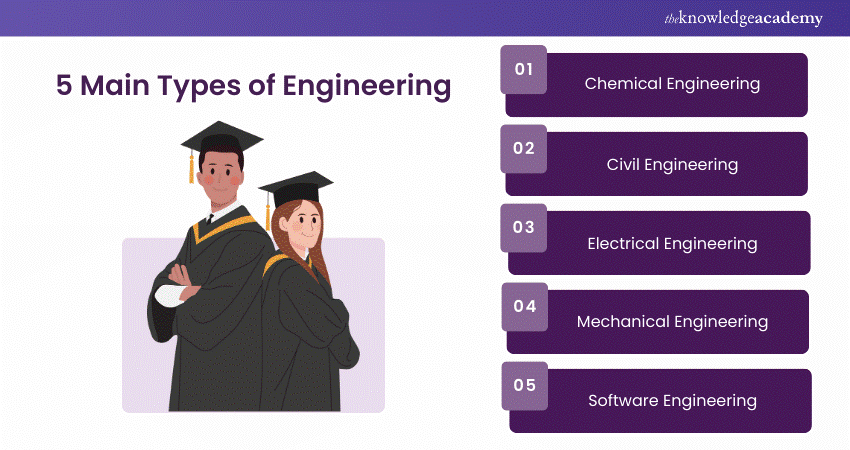We may not have the course you’re looking for. If you enquire or give us a call on +91-181-5047001 and speak to our training experts, we may still be able to help with your training requirements.
Training Outcomes Within Your Budget!
We ensure quality, budget-alignment, and timely delivery by our expert instructors.

Knowing the various Types of Engineering is essential for making a well-informed choice about your future. Every area of expertise demands specific abilities and presents diverse options. By examining different engineering disciplines, you can match your personal passions and skills with a sector that inspires you and fulfills your career aspirations.
Whether you're motivated by creativity, finding solutions, or creating tangible results, this blog will assist you in exploring the various branches of engineering, uncovering your capabilities, and selecting a direction that corresponds with your interests and objectives. Let's consider the options and discover the ideal match for your upcoming endeavors!
Table of Contents
1) What is an Engineer?
2) The Five Main Types of Engineering
a) Chemical Engineering
b) Civil Engineering
c) Electrical Engineering
d) Mechanical Engineering
e) Software Engineering
3) What Other Types of Engineering Are There?
4) What is the Best Type of Engineering?
5) Conclusion
What is an Engineer?
An Engineer excels in mathematics and science but also possesses a curiosity for understanding the processes and construction of objects. Who enjoys analysing, coming up with practical solutions for issues, and designing new ideas.
Adding to the complexity of this seemingly simple question, engineering divides into numerous subfields within each major discipline, leading to even greater intricacies and distinctions among the various engineering specialties.
One instance is the group of Mechanical Engineers, which consists of subcategories such as aerospace Engineer, marine Engineer, and automotive Engineer all with distinct tasks and abilities, even though they are all considered 'Mechanical Engineers.
The Five Main Types of Engineering
Many sources acknowledge five to six main Types of Engineering, with the rest often categorised as subdivisions or closely linked to one of these types. Firstly, let's comprehend the primary ones.

1) Chemical Engineering
Chemical Engineering entails discovering methods to transform basic materials into final products using chemical processes. Therefore, Chemical Engineers must attain knowledge in mathematics and physics just like other engineers, in addition to chemistry and biology.

A Chemical Engineer's duties involve refining petroleum to make fuels or plastics, producing pharma drugs, and developing renewable energy sources.
2) Civil Engineering
Civil Engineers deal with the issues related to infrastructure. As mentioned by BLS, the range of projects they create, construct, and care for covers a variety of public and private sectors like bridges, roads, tunnels, dams, and water and sewer systems.
Civil Engineers were responsible for enabling the construction of infrastructure like the Brooklyn Bridge, the Erie Canal, and the Thames Tunnel in London. These three are only a few among many Civil Engineering landmarks listed.
Transform Your Civil Engineering Projects with Civil 3D Training Register Now!
3) Electrical Engineering
The study of electricity, electronics, and electromagnetism is known as Electrical Engineering. It includes understanding the workings of electricity to apply the information to engineering tasks. Electrical Engineers shaped the 20th century by creating technologies that transform society.

Universal electric power, telecommunications, radio, and television were provided to us by them. Today, we can utilise electronic monitoring, medical scanning, computers, and the internet.
4) Mechanical Engineering
The majority of individuals typically envision a mechanical Engineer when thinking about an Engineer. They are liable for creating, constructing, and repairing mechanical systems like machines, tools, or engines. To attain that, you must entail and implement the fundamentals of Physics, Materials Science, and Mathematics.
Mechanical Engineering is the most versatile field of engineering, providing several career opportunities to explore later. As a Mechanical Engineer, you have the opportunity to design a variety of things such as automobiles, aircraft, robots, medical devices, heating and cooling systems, power generation equipment, and more.
5) Software Engineering
Software Engineering is viewed as a division of Computer Science in which engineering principles are applied to create, construct, and upkeep computer software. A software Engineer's role does not involve dealing with computer hardware, and they are not the same as a programmer, who focuses mainly on coding.
Software Engineers contribute in all stages of the software development process, from analysing requirements to designing system architecture, coding, and testing for functionality and quality.
Elevate your coding skills and design the future with our Software Engineering Courses Sign up Now!
What Other Types of Engineering are There?
There is almost an equal number of engineers as there are industries in general. Below is a summary of thirteen distinct categories in the field of engineering.
1) Industrial Engineering
Industrial Engineering concentrates on enhancing intricate systems and procedures across different sectors. This can be relevant to sectors such as manufacturing, services, transportation, healthcare, commerce, and more. The industrial Engineer works to enhance these systems or procedures by cutting costs, pinpointing bottlenecks, and minimising waste to increase efficiency.
2) Agricultural Engineering
Agricultural Engineering utilises engineering concepts to enhance and create effective systems and machinery for agricultural production, focusing on aspects like designing machinery, irrigation systems, and managing crops.
3) Aerospace Engineering
Aerospace Engineering is a field of engineering that deals with matters concerning travel within the atmosphere and outer space. In the field of Aerospace Engineering, you would be responsible for creating, advancing, and producing airplanes, spacecraft, satellites, and other technologies related to flight. There are two main divisions in this field.
4) Marine Engineering
Marine Engineering manages the creation and building of marine crafts and constructions, like submarines, ships, and boats. Marine Engineers are immersed in several projects related to ships and other maritime amenities. Commonly, Marine Engineers perform various functions on ships, so being ready to work at sea for extended periods is an essential angle to think about if you're interested in following this field of study.
5) Automotive Engineering
The field of Automotive Engineering revolves around creating and upkeeping vehicles: it encompasses the processes of designing, advancing, and upkeeping. A particular field of engineering that involves principles from Mechanical Engineering as well as Electrical, Software, and Safety Engineering.

6) Nuclear Engineering
The field of Nuclear Engineering involves researching and utilising nuclear processes and technologies for power generation, radiation detection, and nuclear medicine, with an emphasis on safety, waste management, and efficient use of resources.
7) Petroleum Engineering
Petroleum Engineering includes the process of searching for, extracting, and producing oil and gas reserves, necessitating knowledge in reservoir assessment, drilling methods, and production enhancement to guarantee effective and environmentally friendly petroleum activities.
8) Biomedical Engineering
Biomedical Engineering applies engineering principles and technologies to create and enhance medical devices, equipment, and healthcare systems to improve patient care and outcomes.
9) Mining and Geological Engineering
The field of Mining and Geological Engineering focuses on extracting and processing minerals and other geological resources. It involves expertise in mine planning, geotechnical engineering, and environmental management to ensure safety and efficiency.
10) Transportation Engineering
Transportation Engineering focuses on creating, building, and managing transportation networks for both passengers and cargo. It consists of air, rail, highway, road, and pipeline transportation. Engineers are accountable for improving the efficiency of traffic flow and ensuring safety.
It is important for them to take into account the environment, as well as national and local laws, and the use of energy and its effect on climate change when it comes to transportation.
11) Environmental Engineering
Environmental Engineering uses engineering concepts to address environmental problems such as pollution, creating renewable energy sources, and managing waste. Your knowledge base should encompass soil science, chemistry, and biology as well.
12) Pharmaceutical Engineering
Pharmaceutical Engineering combines Chemical Engineering principles with Biotechnology and Industrial Engineering to create new medicines and balance the secure production and delivery of these medications. Pharmaceutical Engineers plan thorough research on current drugs and their effect before starting the development of new medication.
13) Textile Engineering
Textile engineering focuses on producing and upgrading textile goods. People working in this field use fibers, threads, textiles, and other elements to create various products, including materials for medical equipment, fireproof fabrics for fire fighters, and biomedical materials for medical purposes.
The procedure involves choosing raw materials, perfecting manufacturing methods, and producing textile goods.
What is the Best Type of Engineering?
Engineering is at the front of evolution in a world fueled by innovation and always testing the limits of what is achievable. The wide variety of engineering disciplines shows how humans are continuously striving to address a range of challenges, including building eco-friendly urban areas and exploring the enigmas of quantum physics.
The optimal engineering field for you depends on matching your goals and interests, despite each field's distinct appeal and difficulties. By investigating the various engineering branches, you can identify the most suitable one for your future path.
Conclusion
Selecting a suitable engineering specialisation is an essential step that influences your future professional journey. If you are dedicated to creating reliable solutions, designing cutting-edge technology, or enhancing infrastructure, there is an engineering field that suits your interests and skills. You have the power to shape the future, so make smart decisions!
Elevate your personal and professional skills today with Personal Development Courses Register Now!
Frequently Asked Questions

The engineering field is always changing due to the emergence of new technologies and industries. Future engineering courses that are expected to be challenging will concentrate on rapidly growing and evolving fields like renewable energy, artificial intelligence, and biotechnology.

Engineering consists of many profitable career options, all of which have the potential to earn a significant amount of money. Various factors influence their salaries, such as the industry they are employed in, the location of their Job, their level of experience, and their education.

The Knowledge Academy takes global learning to new heights, offering over 30,000 online courses across 490+ locations in 220 countries. This expansive reach ensures accessibility and convenience for learners worldwide.
Alongside our diverse Online Course Catalogue, encompassing 19 major categories, we go the extra mile by providing a plethora of free educational Online Resources like News updates, Blogs, videos, webinars, and interview questions. Tailoring learning experiences further, professionals can maximise value with customisable Course Bundles of TKA.

The Knowledge Academy’s Knowledge Pass, a prepaid voucher, adds another layer of flexibility, allowing course bookings over a 12-month period. Join us on a journey where education knows no bounds.

The Knowledge Academy offers various Personal Development Courses, including the Motivation and Goal Setting Training, Job Search Course and the Software Engineering Course. These courses cater to different skill levels, providing comprehensive insights into Becoming a Nanotechnology Engineer.
Our Business Skills Blogs cover a range of topics related to Personal Development, offering valuable resources, best practices, and industry insights. Whether you are a beginner or looking to advance your Development skills, The Knowledge Academy's diverse courses and informative blogs have got you covered.
Upcoming Business Skills Resources Batches & Dates
Date
 Engineering Skills Training
Engineering Skills Training
Fri 29th Nov 2024
Fri 17th Jan 2025
Fri 21st Mar 2025
Fri 16th May 2025
Fri 18th Jul 2025
Fri 19th Sep 2025
Fri 21st Nov 2025







 Top Rated Course
Top Rated Course



 If you wish to make any changes to your course, please
If you wish to make any changes to your course, please


